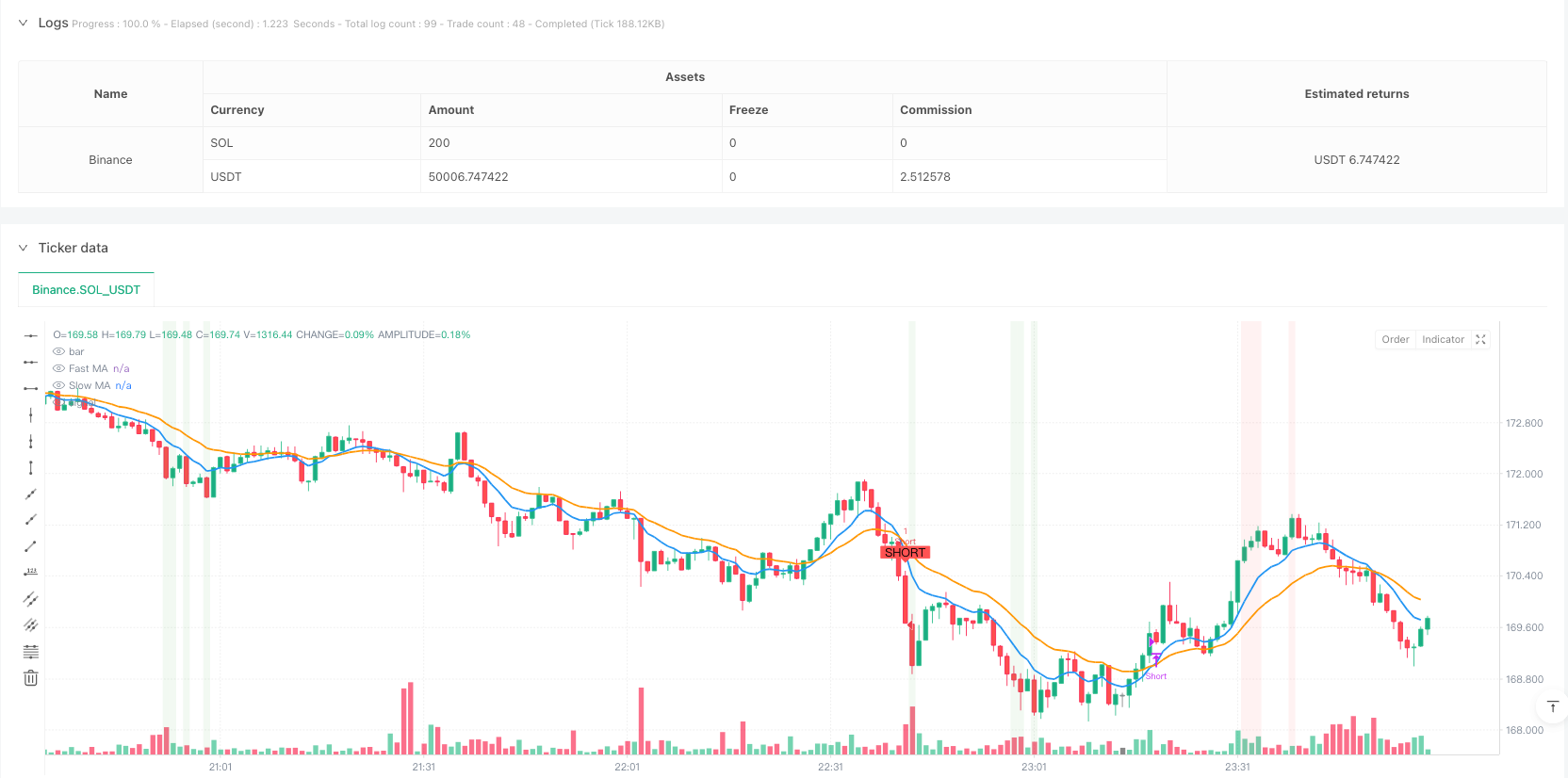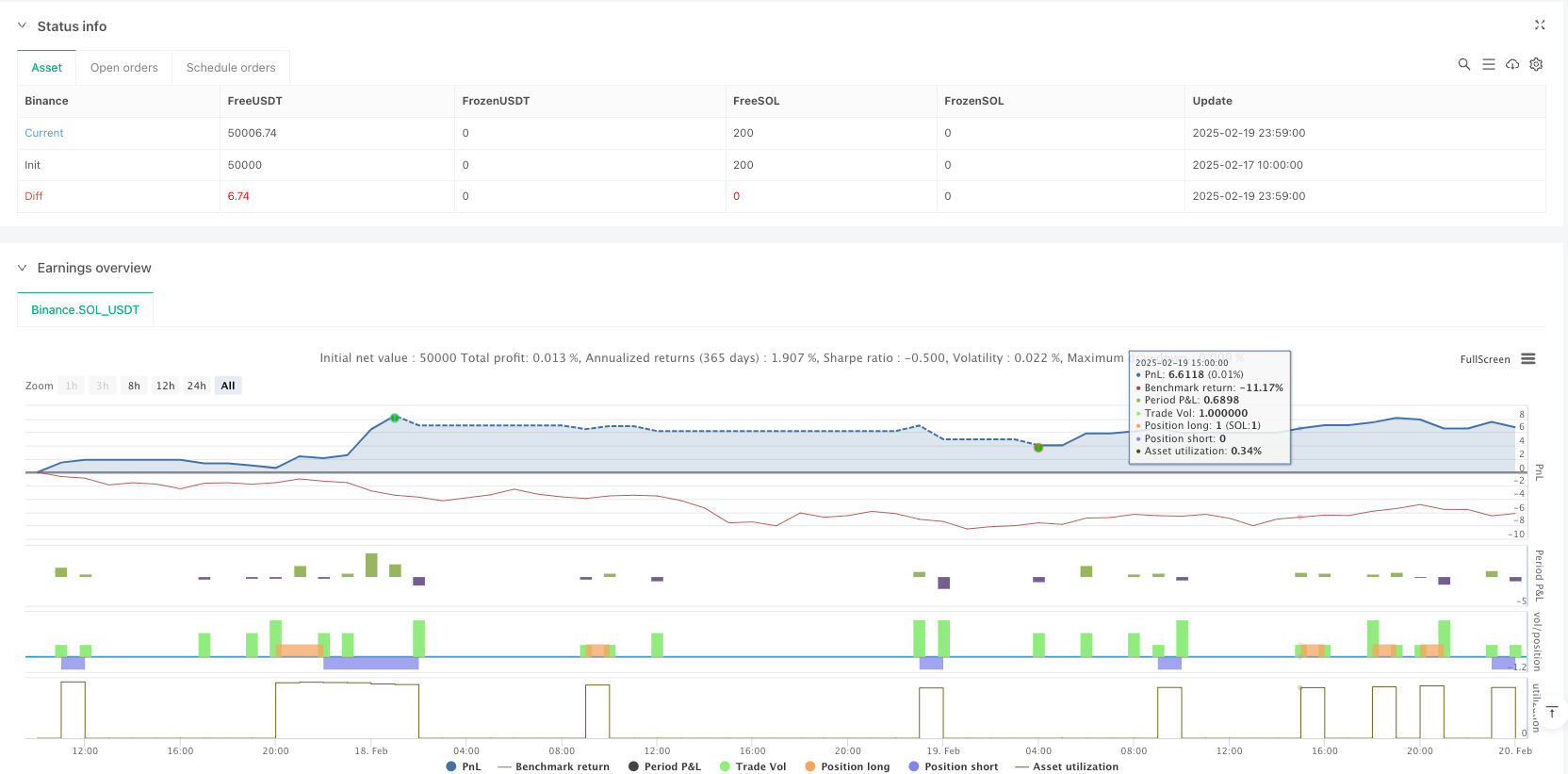

概述
本策略是一个基于趋势跟踪和动量交易的智能化交易系统,主要针对短线和快速交易场景设计。策略核心采用了指数移动平均线(EMA)交叉、相对强弱指标(RSI)和平均真实波幅(ATR)的组合判断系统,并配备了基于百分比的智能止损机制。该策略特别适用于1分钟和5分钟等较短周期的图表交易,通过动态调整参数来适应不同的市场环境。
策略原理
策略运用了三个核心技术指标构建交易信号系统: 1. 快慢指数移动平均线(EMA)交叉系统 - 采用9周期和21周期的EMA组合,通过金叉和死叉判断趋势方向 2. RSI超买超卖过滤器 - 使用14周期RSI,设置70和30作为超买超卖阈值,避免在极端情况下入场 3. ATR波动率确认机制 - 利用ATR衡量市场波动性,确保只在突破足够强度时才执行交易
交易逻辑设计清晰明确:多头入场需要快线上穿慢线、RSI低于70且价格突破ATR倍数确认;空头入场需要快线下穿慢线、RSI高于30且价格跌破ATR倍数确认。系统配备了1%的动态止损位置,有效控制风险。
策略优势
- 多重技术指标交叉验证,提高信号可靠性
- 动态参数自适应系统,适合不同时间周期
- 基于ATR的波动率过滤机制,减少虚假信号
- 智能止损系统,严格控制每笔交易风险
- 完整的可视化系统,包括清晰的图形标记和背景提示
策略风险
- 震荡市场可能产生频繁交易信号,增加交易成本
- 固定百分比止损可能不适合所有市场环境
- 在高波动期间可能出现滑点风险
- 参数优化需要持续监控和调整
为降低风险,建议: - 根据不同品种特性调整止损百分比 - 增加趋势强度确认机制 - 实时监控市场波动情况 - 建立完善的资金管理系统
策略优化方向
- 引入自适应止损机制,根据市场波动动态调整止损比例
- 增加趋势强度过滤器,提高交易信号质量
- 开发智能时间过滤系统,避开低流动性时段
- 整合成交量指标,增强信号可靠性
- 开发动态参数优化系统,实现策略自我调整
总结
该策略通过多重技术指标的协同作用,构建了一个完整的交易系统。系统在保持灵活性的同时,通过严格的风险控制确保交易安全。虽然存在一定局限性,但通过持续优化和完善,该策略具有良好的应用价值和发展潜力。
策略源码
/*backtest
start: 2025-02-17 10:00:00
end: 2025-02-20 00:00:00
period: 1m
basePeriod: 1m
exchanges: [{"eid":"Binance","currency":"SOL_USDT"}]
*/
// This Pine Script™ code is subject to the terms of the Mozilla Public License 2.0 at https://mozilla.org/MPL/2.0/
// © DBate
//@version=6
strategy("Enhanced Scalping Strategy with Stop Loss", overlay=true)
// Input parameters
fastMA_length = input.int(9, title="Fast MA Length", minval=1)
slowMA_length = input.int(21, title="Slow MA Length", minval=1)
RSI_length = input.int(14, title="RSI Length", minval=1)
RSI_overbought = input.int(70, title="RSI Overbought")
RSI_oversold = input.int(30, title="RSI Oversold")
ATR_multiplier = input.float(1.5, title="ATR Multiplier")
ATR_length = input.int(14, title="ATR Length", minval=1)
stopLossPercent = input.float(1.0, title="Stop Loss %", minval=0.1) / 100 // Convert percentage to decimal
// Timeframe-specific adjustments
is1m = timeframe.period == "1"
is5m = timeframe.period == "5"
// Adjust input parameters based on timeframe
fastMA_length := is1m ? 9 : is5m ? 12 : fastMA_length
slowMA_length := is1m ? 21 : is5m ? 26 : slowMA_length
RSI_length := is1m ? 14 : is5m ? 14 : RSI_length
// Moving Averages
fastMA = ta.ema(close, fastMA_length)
slowMA = ta.ema(close, slowMA_length)
// RSI Calculation
rsi = ta.rsi(close, RSI_length)
// ATR Calculation for volatility filter
atr = ta.atr(ATR_length)
// Trade state variables
var bool inLongTrade = false
var bool inShortTrade = false
var float entryPrice = na
var float stopLossLevel = na
// Long and Short Conditions with added filters
longCondition = ta.crossover(fastMA, slowMA) and rsi < RSI_overbought and close > fastMA + ATR_multiplier * atr
shortCondition = ta.crossunder(fastMA, slowMA) and rsi > RSI_oversold and close < fastMA - ATR_multiplier * atr
// Ensure previous trades are closed before entering new ones
if (longCondition)
strategy.close("Short")
strategy.entry("Long", strategy.long)
entryPrice := close
stopLossLevel := close * (1 - stopLossPercent) // 1% below entry for long trades
inLongTrade := true
inShortTrade := false
if (shortCondition)
strategy.close("Long")
strategy.entry("Short", strategy.short)
entryPrice := close
stopLossLevel := close * (1 + stopLossPercent) // 1% above entry for short trades
inShortTrade := true
inLongTrade := false
// Stop Loss Exits
stopLossLongCondition = inLongTrade and close <= stopLossLevel
stopLossShortCondition = inShortTrade and close >= stopLossLevel
// Exit Conditions (Moving Average crossover or Stop Loss)
exitLongCondition = inLongTrade and (ta.crossunder(fastMA, slowMA) or stopLossLongCondition)
exitShortCondition = inShortTrade and (ta.crossover(fastMA, slowMA) or stopLossShortCondition)
// Reset trade state on exit
if (exitLongCondition)
strategy.close("Long")
inLongTrade := false
inShortTrade := false
if (exitShortCondition)
strategy.close("Short")
inShortTrade := false
inLongTrade := false
// Plot buy and sell signals
plotshape(longCondition, title="Long Signal", location=location.belowbar, color=color.green, style=shape.labelup, text="LONG")
plotshape(shortCondition, title="Short Signal", location=location.abovebar, color=color.red, style=shape.labeldown, text="SHORT")
// Plot moving averages
plot(fastMA, title="Fast MA", color=color.blue, linewidth=2)
plot(slowMA, title="Slow MA", color=color.orange, linewidth=2)
// Background color for overbought/oversold RSI
bgcolor(rsi > RSI_overbought ? color.new(color.red, 90) : na, title="Overbought Background")
bgcolor(rsi < RSI_oversold ? color.new(color.green, 90) : na, title="Oversold Background")
// Alerts
alertcondition(longCondition, title="Long Alert", message="Buy Signal")
alertcondition(shortCondition, title="Short Alert", message="Sell Signal")
alertcondition(exitLongCondition, title="Exit Long Alert", message="Exit Long Signal")
alertcondition(exitShortCondition, title="Exit Short Alert", message="Exit Short Signal")
相关推荐